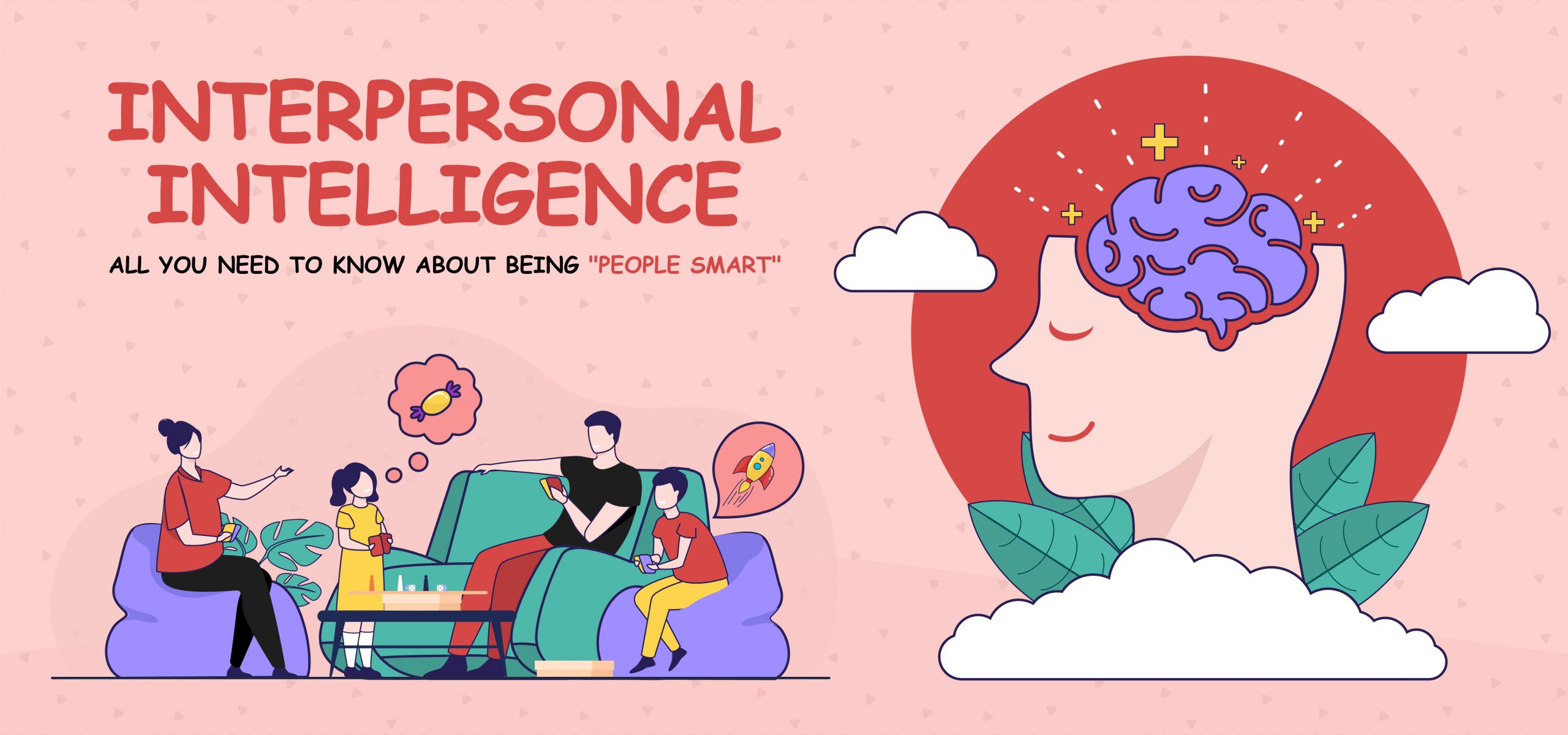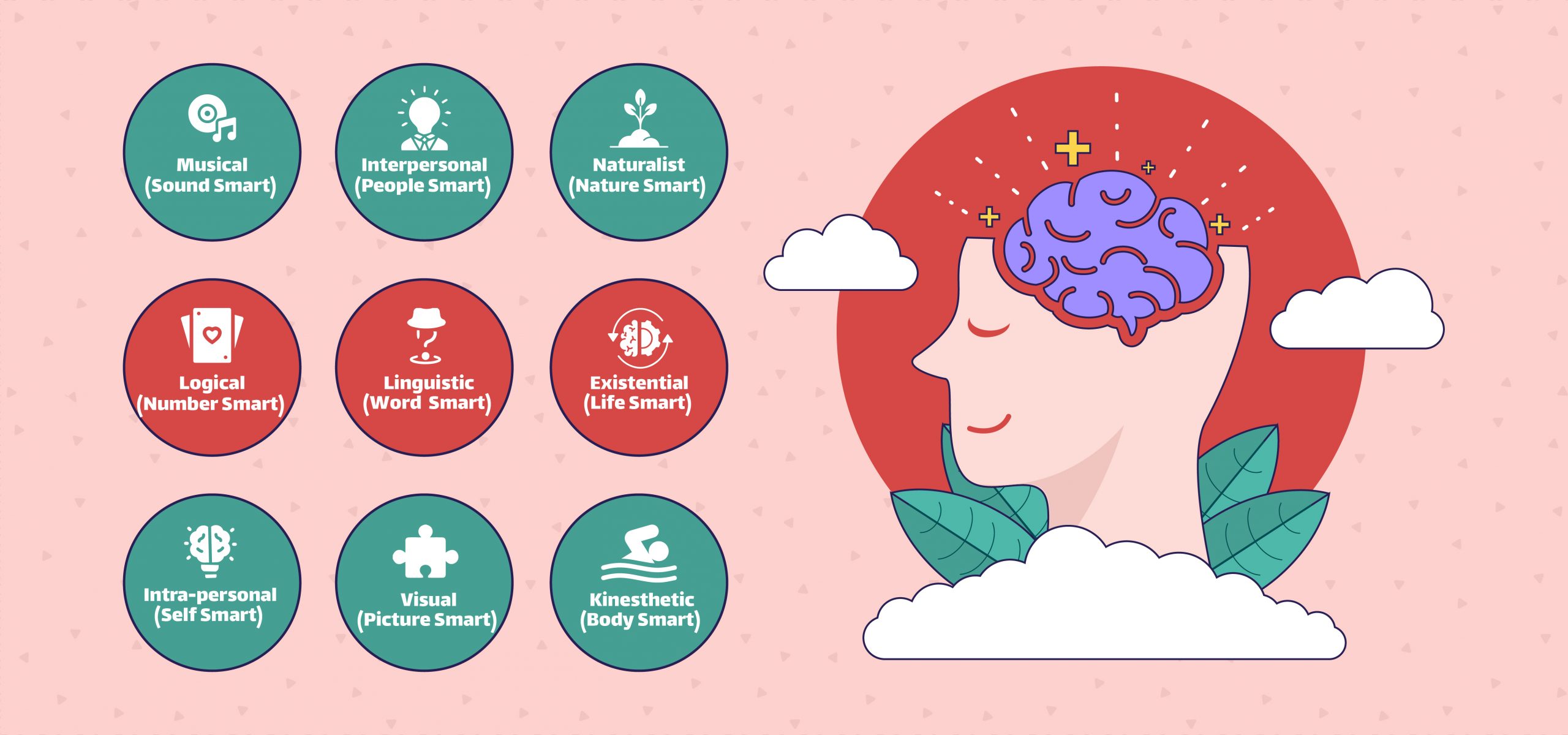-
Interpersonal Intelligence: All You Need To Know About Being People Smart

Some individuals are astonishingly great with people.
You might have just met them but they can make you feel like you know each other since elementary school.
They can walk in the room and talk to anyone, they have a knack for understanding others, engaging and interacting clearly, and even influencing people. They are people smart.
So how do they do it — and with such a charm?
Well, two words: Interpersonal Intelligence.
It’s because these people are gifted with high interpersonal intelligence — one of the multiple intelligences that humans possess.
And in this article, we’ll walk you through what exactly is interpersonal intelligence, the multiple intelligence theory, examples of interpersonal intelligence, and how you can develop it.
Sounds like a plan? Let’s dive in.
What’s Interpersonal Intelligence?
To put it simply: it is the ability to be “people smart”.
The prefix “inter-” in interpersonal refers to between. It’s one’s behavior and skills when between people.
While intrapersonal intelligence deals with the ability to understand one’s own thoughts and emotions, interpersonal intelligence is the ability to understand others.
An individual with interpersonal intelligence can effectively relate to others, understand their feelings, needs, motivations that help them to manage the relationship.
An intrapersonal intelligent person can easily be spotted with his skills to communicate, participate in talk and discussions, handle social situations, dealing with others, and sensibility towards people’s feelings. Some of the common traits of people with interpersonal intelligence are:
Good Verbal and Non-Verbal Communication
People with interpersonal intelligence are effective communicators — both verbally and non-verbally. They can interact clearly and confidently in any situation, be it through words and body language.
Active Listening
Active listening is paying full selective attention to the speaker to truly understand the message and perspective. It also involves paying attention to body language and visual cues.
Empathy
Interpersonal intelligent people are empathetic that gives them the ability to understand other’s views and perspectives. It is also a major factor that helps people build better relations with others.
Conflict Resolution
Interpersonal intelligence also helps in resolving issues and conflicts. People with high interpersonal intelligence are great negotiators and persuaders who can lead to a harmonious resolution to benefit all sides.
Why is Good Interpersonal an “Intelligence”?
Intelligence can be simply defined as the ability to acquire and apply knowledge or skill.
But we are beaten into believing that intelligence is something related to a person’s logical and reasoning abilities.
One of the major reasons for this is IQ tests that were first invented to measure reasoning and problem-solving abilities. And with its popularity as a barometer to measure human intelligence, intelligence became a more specific criterion.
Suggested Read: What Is Considered a High IQ? Here’s Everything Need To Know About Intelligence Quotient
However, Howard Gardner’s theory of multiple intelligence says something different.
As per Gardner, intelligence can not be defined by a single criterion like intelligence quotient. Instead, it deals with various behavioral criteria.
For example, someone good with music can be equally intelligent as someone who can solve difficult math problems. It’s just they both have different types of intelligence. So he categorized human intelligence into eight different types:
- Visual-Spatial Intelligence
- Linguistic-Verbal Intelligence
- Logical Intelligence
- Bodily-Kinesthetic Intelligence
- Musical Intelligence
- Interpersonal Intelligence
- Interpersonal Intelligence
- Naturalistic Intelligence
And one of them is interpersonal intelligence, the ability to be people smart.

(Gardner’s Theory of Multiple Intelligence — originally, he proposed 8 types of intelligence in his book but has alluded the possibility of 9th one “existential intelligence” in his several works.)
Example of Interpersonal Intelligence
Gardner in his book: “Multiple Intelligences: New Horizons in Theory and Practice”, shared the example of Anne Sullivan who’s an epitome of interpersonal intelligence.
Picture this:
A partly blind woman with barely any formal training in teaching takes the task to teach a seven-year-old blind-deaf child. Later that child grew up to be the first deaf-blind to earn a Bachelor of Arts degree and a celebrated author.
That’s what Anne Sullivan did. She was the tutor of the renowned American author Helen Keller.
Sullivan taught Keller and became her life-long companion. She demonstrated a high interpersonal intelligence with Keller that made her understand the needs, feelings, and motivation of a deaf-dumb child and teach her.
Even people like Mahatma Gandhi, Martin Luther King Jr., Oprah Winfrey, Mother Teresa, and many famous personalities are famous for understanding people and showing high interpersonal intelligence.
Still here with me? Perfect. Because now we’re going to get into the nitty-gritty of intrapersonal intelligence.
How To Improve Your Interpersonal Intelligence?
1. Practice Empathy
Interpersonal starts with others. And empathy is one of the best ways to understand someone else’s perspective. While communicating, acknowledge other’s views by stepping in their shoes. People with interpersonal intelligence are great at this. They put themselves in other’s place to understand the situation and communicate effectively.
2. Become a Good Listener
Recently I came across a quote on “listening” by the cartoonist and journalist Kin Hubbard. It’s a nugget of wisdom for developing interpersonal intelligence. The quote goes like this:
“The only way to entertain some folks is to listen to them.”
Got the point? Good listening is essential for interpersonal. Whether you are trying to negotiate something, mentoring or coaching someone, dealing with a dispute, or making a decision — good listening can power-up your interpersonal and communication. Additionally, good questioning while listening can give a message that you’re inquisitively paying attention to the speaker. Listening also gives a chance to peep into other’s minds and behavior for better communication.
3. Introspect
Introspection is examining one’s internal thoughts and feelings. Practicing introspection can make you self-aware about everyday interactions with others and their reactions that can be vital to improving interpersonal intelligence.
One way to do this is by keeping a daily journal of your interactions that you feel you may have messed up. Or the interactions that you may like to improve. Understand why you interacted and reacted that way. Whether you could have communicated better — the words, body language, or if you could have done to better understand others. Also, keep a track of your successful interactions and what made it feel so positive.
4. Manage Your Emotions
Emotional and Interpersonal Intelligence are interrelated. Learning to manage your emotions can interestingly help you upgrade your interpersonal intelligence. People with high EQ are empathetic and good at understanding others. Typically they are also great collaborators and communicators. So if you learn to manage your emotions you can improve your interpersonal.
Start with something simple like staying aware of your emotions. During some situations, it’s natural to react with an emotional outburst. But instead of reacting, examine how your actions will affect others and the consequences. Also, don’t underestimate the power of your attitude. Maintaining a positive one will directly impact your mood, emotions, and those around you.
Wrapping Up
The theory of multiple intelligence is challenging the old notion of intelligence that looks at just one criterion. What the major belief considers just a talent or soft skill, Gardner presented it as a type of intelligence — interpersonal intelligence. Although surrounded by some controversy, it makes some real sense. If the ability to understand math makes you intelligent then even being people smart — understanding people — should be considered as intelligence. It’s just they both have different types of intelligence.
Want To Unleash the Genius in You?
Smart Brain is a ridiculously fun Brain Game that’ll pump your brain muscles and make you smarter.
Download Now For FREE
 17864
17864







